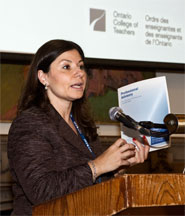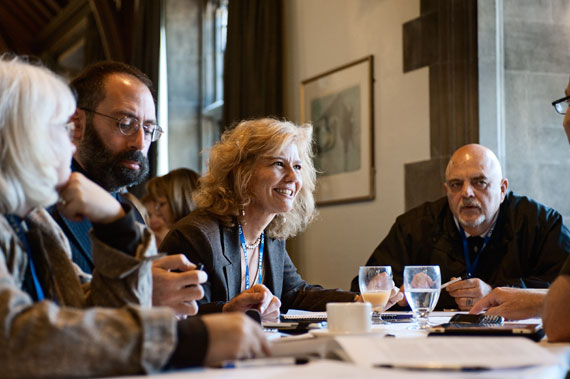Governing Ourselves informs members of legal and regulatory matters affecting the profession. This section provides updates on licensing and qualification requirements, notification of Council resolutions and reports from various Council committees, including reports on accreditation and discipline matters.
Professional Advisory
College issues advisory on use of electronic communication and social media
From Twitter to Facebook, electronic communication and social media are changing the way we learn and interact – and teachers across Ontario are dealing with those changes every day.
That's why the College has issued the Professional Advisory on the Use of Electronic Communication and Social Media that is included with this magazine. The advisory provides advice to College members on the responsible and professional use of electronic communication and social media.

Liz Papadopolous
"The College recognizes that social media offer new and exciting options for teaching and learning, and we want to alert members to potential risks and provide guidance for responsible, professional use," says College Registrar Michael Salvatori, OCT.
"Respecting professional boundaries online is key to maintaining the public trust and appropriate professional relationships with students.
"The simple message for Ontario certified teachers is this: Represent yourself in social media the same way you would in person."
The College encourages teachers to use electronic communication and social media wisely, but as a regulatory body the College has a responsibility to educate and inform members about their professional responsibilities.
"Teachers are intellectually curious and always looking for ways to enhance their students' education," says Council Chair Liz Papadopoulos, OCT. "Members have been asking for guidance on how to use social media and electronic communication appropriately. Nobody wants to jeopardize their students' well-being or compromise their own professionalism."
The advisory applies to all College members including principals, supervisory officers and directors of education.
Predicated on our professional standards
The Ethical Standards for the Teaching Profession and the Standards of Practice for the Teaching Profession provide the foundation for the College's advice.
Care, trust, respect and integrity are the cornerstones of teachers' ethical responsibilities and commitments. All our communications with students, parents, guardians and the public must reflect this vision of professional practice.
College members have a unique position of trust and authority in society and therefore must maintain appropriate professional boundaries at all times, in all forms of communication.
Private versus professional
The professional advisory on the use of electronic communication and social media stresses that the onus of responsibility is on members – even when students are the ones who initiate online interaction.
The advisory also reinforces a point made by Canada's Supreme Court that teachers' off-duty conduct matters and is relevant to their suitability to teach.

Participants at the professional advisory information session held in Toronto on April 11, 2011
Know the dangers
Electronic messages are not anonymous. They can be tracked, misdirected and manipulated. They can be forwarded and posted by others and distributed more widely than intended. They live forever on the Internet.
You lose control once your message or photo has been digitized and sent.
If you're going to create and maintain an online presence, make sure it aligns with your professional reputation.
A good benchmark to follow is to share with students only the information that you would comfortably share in a classroom setting or in the community.
Criminal, civil and disciplinary proceedings
The inappropriate use of electronic communication and social media can be used as evidence in criminal and civil proceedings. Also, the findings and orders of criminal or civil proceedings can be used (and are used) as evidence in College disciplinary hearings. In recent years the College has been dealing with cases where teachers misuse social media and electronic communication and end up facing disciplinary measures. The behaviours behind these disciplinary consequences include inappropriate e-communication, sending graphic sexual materials, misusing school computers, and grooming and luring via the Internet.
Members who engage in inappropriate online interactions with students or others can be exposed to disciplinary action and findings of professional misconduct.
College consultations
In crafting the advisory, the College consulted experts in social media and electronic communication and solicited feedback from the following organizations:.
- Association des directions et des directions adjointes des écoles franco-ontariennes
- Association des enseignantes et des enseignants franco-ontariens
- Catholic Principals' Council of Ontario
- Council of Ontario Directors of Education
- Conseil ontarien des directrices et des directeurs de l'éducation de langue française
- Elementary Teachers' Federation of Ontario
- Ontario English Catholic Teachers Association
- Ontario Principals' Council
- Ontario Secondary School Teachers' Federation
- Ontario Teachers' Federation.
Nobody thought it would be wise – or even possible – to micromanage teachers' use of social media and electronic communications. But all agreed that a set of guiding principles could help members develop their own best practices and identify and avoid pitfalls.
Additional copies of the advisory are available at www.oct.ca.
Watch the video for quick access to the dos and don'ts of using social media.
Should you accept Facebook friend requests from students?
YouTube, blogs, Twitter: How do you responsibly incorporate social media into your classroom? In this dynamic six-minute video, educators, teachers and social-media experts tell us how to use electronic communication and social media responsibly and offer practical tips.
Engage in dialogue with your colleagues.
Explore innovative ways of using social media with your students.
Learn about the potential pitfalls.
Looking for tips
- Know that electronic messages can be manipulated and forwarded.
- Understand that text and images live forever on the Internet.
- Be aware of your employers' policies.
- Monitor your privacy settings.
- Refuse "friend" requests from students.
- Avoid communicating with students late at night.
- Know that the misuse of e-communication and social media – whether inadvertent or intentional – can have serious disciplinary consequences.
- Ask: How does your online presence reflect your professionalism?